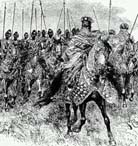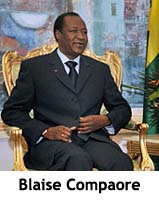 Between the 10th and 11th centuries, Mossi tribes immigrated into the region from Ghana, pushing out the original Yonyonse inhabitants, and began creating complex states complete with powerful militaries.
Between the 10th and 11th centuries, Mossi tribes immigrated into the region from Ghana, pushing out the original Yonyonse inhabitants, and began creating complex states complete with powerful militaries. There were a number of Mossi kingdoms within Burkina Faso, the most significant being the Wagadogo (Ouagadougou) and Yatenga, and they survived until the late 19th century.
Following a decade of intense rivalry and competition withBritain and France, the Mossi's were defeated by French forces, and subsequently colonized in 1896.
In 1958, the region-achieved self-governance, becoming the Republic of Upper Volta, and by 1960 had gained complete independence from France.
Subsequently, the Upper Volta suffered from numerous military coups in its early days as a new nation. In 1983 Thomas Sankara, a Burkinabe military captain, Marxist revolutionary and Pan-Africanist theorist, seized power, and became president.
Sankara changed the name of Upper Volta to Burkina Faso, meaning "the country of honorable people" on August 4, 1984; he was a widely regarded and charismatic leader whose revolutionary programs for African self-reliance made him an icon to Africa's poor.
 In 1987 a French-backed coup overthrew and then assassinated Sankara as a result of his revolutionary ideals, and Captain Blaise Compaore came into power.
In 1987 a French-backed coup overthrew and then assassinated Sankara as a result of his revolutionary ideals, and Captain Blaise Compaore came into power. Dissatisfied with the progression of the country, a new constitution was drafted in 1991, and countrywide elections held the following year - the results of which helped form a stable coalition government.
With a high population density and very limited natural resources, most of the citizens remain economically suppressed. Local health conditions are improving, but still generally poor in the rural areas. The country is reported to have the second-highest illiteracy rate on the planet.
The death of a schoolboy in early 2011 sparked a country-wide uprising, complete with military mutiny, lasting some two months before they were subdued by a consideration to change the constitution.
No comments:
Post a Comment